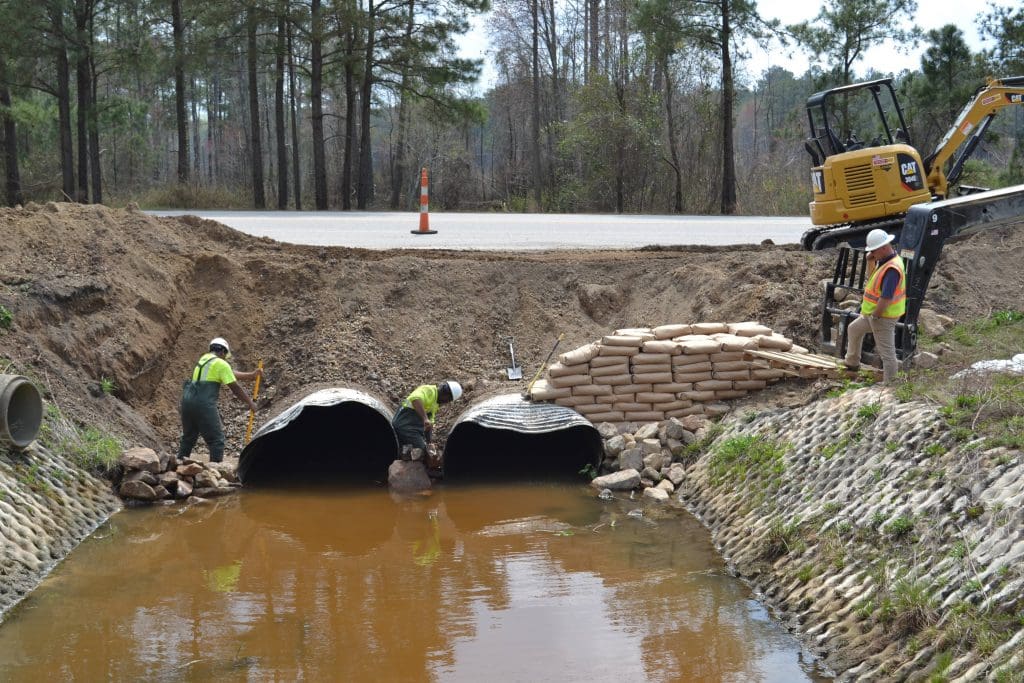
An overlooked or avoided revenue stream lawn and landscape professionals can consider adding to their business are government contracts. These include everything from military installations to roadside and highway maintenance.
Landart Solutions, based in Fayetteville, North Carolina, has been pursuing federal government contracts since they started as a business 14 years ago.
“We have contracts for both installation and ground maintenance for the Department of Defense,” says Matt Horn, CRO and owner of Landart Solutions. “Primarily, our focus is landscape installation on new construction and renovation projects for military installations. We also work on municipal and state government contracts for cities, airports, schools, senior centers, NCDOT, and state universities.”
J&J Landscape Management, Inc., based in Lorton, Virginia, started in 1998 and won their first government contract for the Department of the Navy in 2000. James Derrington, president of J&J Landscape Management, says there are a lot of government contracting opportunities because of their location in the Washington, D.C. area.
“Initially, we were drawn to work on government contracts because of the scope and size of the projects,” Derrington says. “As we won more contracts and figured out that we were pretty good at providing these services, we were drawn to work on some of our nation’s most important buildings and sites around the DC area. That aspect of our work means a lot to our entire team. Our staff is very proud of the work they do on these sites.”
Derrington says one misconception about government contracts is that you have to be a large regional or national landscape company to compete.
“This simply isn’t true,” Derrington says. “Small local or municipal government contracts can be a great addition to a growing company’s portfolio.”
Benefits and Drawbacks of Government Contracts
Horn says some of the benefits of taking on government contracts include guaranteed payment when complete on military contracts, cleaner project construction sites and less conflict with subs due to the higher caliber of companies that pursue federal work.

Photo: Landart Solutions
Derrington says in their area, no other sites compare to the size and scope of government properties. He says they also get the opportunity to work at historic sites and national landmarks.
One of the main drawbacks to government work is the challenging procurement process. The additional required paperwork often calls for additional office support. Derrington says that even if a customer loves the service you provide, you can still lose a contract when it goes out to rebid and another qualified bidder beats your price by the smallest of margins. He cautions against letting one government contract become a big part of your annual revenue because if you lose that contract, it’s going to hurt your company.
Horn says there are periodic government delays and national security events can close a military base to civilian contractors. In the case of government shutdowns, having to stop work is a case-by-case matter.
“We did have to stop work during one shutdown but have continued to work during others,” Derrington says. “I think each shutdown affects each government agency differently. We have always been paid per our contracts, but shutdowns do cause payment delays.”
Where to Find Government Contracts
There are several online sources, such as governmentbids.com and sam.gov, to find opportunities to find government contracts to bid on. Horn says they subscribe to services like iSqFt to discover upcoming projects for bid, but most of their work comes from relationships and word of mouth.
“As with any good business practice, establishing good relationships and learning to know key people,” Horn says. “Navigating and finding project opportunities on Fed Biz Ops (now sam.gov) takes time and there are often additional filing requirements federally.”
Derrington says most of their customers seek them out based on their reputation as well.
“For larger maintenance contracts, we have been invited to bid with other companies,” Derrington says. “Once a contract is in place, there are great opportunities for enhancement or add on work that may or may not be bid out. It usually depends on the dollar value of the work and each agency has their own procedures and limits.”
As for the competition for these contracts, Derrington says it is intense as they often compete against larger national companies and smaller, more specialized government contracting firms. Horn says while municipal government contracts typically have three to seven landscape contractors bidding, there is less competition on military installation contracts.
“A lot of companies are scared of all the paperwork, insurance requirements, and access rules that apply to enter military installations,” Horn says.
Setting Yourself Up for Success
When bidding on government contracts, a costly mistake can be not understanding the wage rate requirements and not properly factoring that into your pricing proposal. Government contracts can require you to pay different staff rates than you normally do on private projects.

“You have an obligation to perform these contracts, so if you are losing money on one, that can be a big mistake,” Derrington says. “If you realize a couple of months into the contract that you underbid it, you can’t walk away or renegotiate. Not clearly understanding the scope of work or bidding on a contract that is vague or not properly written are other mistakes that can happen.”
Horn says another mistake is not completing all the filing requirements or not properly filling out the paperwork correctly.
“Read thoroughly and understand all paperwork,” Horn says. “Before proposing pricing, make sure you follow the specifications and requirements as they will be enforced by the contract obligations upon award.”
Derrington notes that performing the contracts you win and keeping your customers happy is vital.
“Every government contract you bid on will review your past performance on similar jobs,” Derrington says. “If you don’t have an excellent past performance record, your bid can be removed from consideration or your score lowered when the government is evaluating proposals.”
Derrington says it can be challenging to break into government contracting because past experience is so important. He suggests looking at small opportunities first.
“Another way to get started would be to explore subcontracting or teaming relationships with another government contractor who has appropriate past experience and the resources to successfully manage a government contract,” he says.
Depending on what type of government contracts you are pursuing, additional requirements or standards may have to be met by your staff. Horn says higher safety standards and additional training are required for “see something, say something” and homeland security on federal military installations.
E-Verify is a requirement and Horn says that some military installations do not accept green card workers; they only allow U.S. citizens. Derrington says background checks are common when working on secure sites.
“Immigration status requirements and background check requirements sometimes have to meet much higher thresholds than the minimum legal requirements of an employee simply onboarding at a landscaping company,” he says. “The background of an employee working at a top secret or secure facility is certainly more scrutinized than the employee working at an HOA or other private site.”

